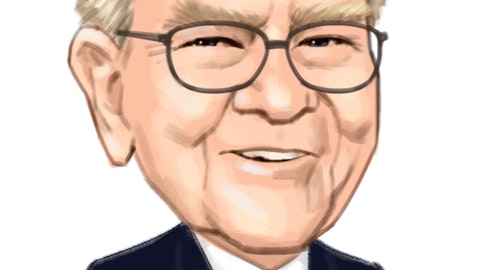So we think that they’re really interesting and novel part of the structure and is really kind of matching to the program and trying to solve problems with our partners. But I’ll pass it to Chris for your first question.
Christopher Hite: Chris, on the therapeutic area question, and I reference back to Marshall’s slide in the prepared remarks, we’ve invested across a number of different therapeutic areas. And so, we are agnostic to therapeutic areas. As it relates to the pharmaceutical companies, what I would say is, what we’re really striving for when we partner with them is we want to partner with them on what they perceive to be and what we perceive to be their most important therapeutic programs. And I think in that regard, that’s what we’ve done here with Merck. And the way we’ve structured the deal, as Marshall just went through, they actually need to decide whether to advance it or not in Phase 3 and only then we get to decide whether to opt in to contribute to that funding in Phase 3, which we think aligns our interests quite well.
Operator: Our next question comes from Chris Schott with J.P. Morgan.
Hardik Parikh: This is Hardik Parikh dialing in for Chris Schott. The first is a follow on to just IRA questions. So, while the industry is still looking for clarity on IRA, how do you think that kind of impacts your focus on oncology versus other therapeutic areas?
Pablo Legorreta: Marshall, why don’t you take that question?
Marshall Urist: I would say, at a high level, nothing about our approach or our focus on various therapeutic areas has really changed in this early period since the IRA. I think we are certainly, as I mentioned in earlier questions, thinking through the implications for various programs, and I think we have to be comfortable with the IRA scenarios that we work through, but I think we’re still, as I said before, really focused on trying to identify exciting innovation and products that we really want to add to the portfolio, and that will remain our focus.
Hardik Parikh: The second question is, in the higher interest rate environment, how have deal terms kind of changed to reflect the higher cost of capital?
Pablo Legorreta: Terry?
Terry Coyne: It’s dynamic. But certainly, I think there’s a couple of ways to answer that question. First is the opportunity set. I think that we feel like we’re seeing a lot of different things that we’re able to look at. And as you know, we’re super selective when we actually do decide to invest. But I think you know the top of the funnel certainly is seeing the benefits of the broader macroenvironment. In terms of the terms, certainly, there is some upward sort of pressure driven by higher rates, that’s sort of natural in a higher rate environment that we would expect that our returns would tick up a little bit as well.
Operator: Our next question comes from Steven Scala with Cowen.
Steven Scala: Congratulations on the good quarter. I have two questions. Regarding the collaboration with Merck for MK-8189 in Phase 2 for schizophrenia, this product was in Phase 2 at Merck in 2017. And perhaps earlier. So, at least five years. Why has the product been in development so long? And what is its remaining patent life? It would seem that Merck has really nothing more than modest interest in this product. Secondly, the gantenerumab GRADUATE trials are large and complex, and will be presented in 22 days. Between now and then, the two studies need to be analyzed, data pooled, presentation prepared. Are you surprised that the data has not been press released yet? And has the data been shared with RPRX? All things considered, one might conclude that the data is not leading to a definitive result. And honestly, the fact that you gave it only passing mention in the prepared remarks doesn’t build confidence.





